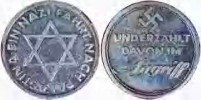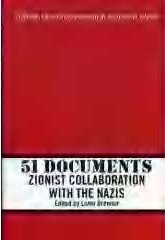The Jew is a caricature of a normal, natural human being, both physically and spiritually. As an individual in society he revolts and throws off the harness of social obligations, knows no order nor discipline. [i]
Similarly, in 1935 an American, Ben Frommer, a writer for the ultraright Zionist-Revisionists, could declare of no less than 16 million of his fellow Jews that:
The fact is undeniable that the Jews collectively are unhealthy and neurotic. Those professional Jews who, wounded to the quick, indignantly deny this truth are the greatest enemies of their race, for they thereby lead them to search for false solutions, or at most palliatives. [ii]
This style of Jewish self-hatred permeated a great deal of Zionist writing. In 1934 Yehezkel Kaufman, then famous as a scholar of biblical history at Jerusalem’s Hebrew University and himself a Zionist, though an opponent of the bizarre theory of the Negation of the Diaspora, aroused furious controversy by culling the Hebrew literature for yet worse examples. In Hebrew the ranters could really attack their fellow Jews without fear of being accused of providing ammunition for the Jew-haters. Kaufman’s Hurban Hanefesh (Holocaust of the Soul) cited three of the classic Zionist thinkers. For Micah Yosef Berdichevsky the Jews were “not a nation, not a people, not human”. To Yosef Chaim Brenner they were nothing more than “Gypsies, filthy dogs, inhuman, wounded, dogs”. To A.D. Gordon his people were no better than “parasites, people fundamentally useless”. [iii]
Naturally Maurice Samuel had to apply his fine hand to concocting libels against his fellow Jews. In 1924, in his work You Gentiles, he fabricated a Jewry driven by its own sinister demiurge to oppose the Christian social order:
We Jews, we the destroyers, will remain the destroyers forever. Nothing that you will do will meet our needs and demands. We will forever destroy because we need a world of our own, a God-world, which is not your nature to build ... those of us who fail to understand that truth will always be found in alliance with your rebellious factions, until disillusionment comes, the wretched fate which scattered us through your midst has thrust this unwelcome role upon us. [iv]
Labour Zionism produced its own unique brand of Jewish self-hatred. In spite of its name and pretensions, Labour Zionism was never able to win over any significant section of the Jewish working class in any country cf the Diaspora. Its members had a self-defeating argument: they claimed that the Jewish workers were in “marginal” industries, such as the needle trades, which were unessential to the economy of the “host”, nations, and therefore the Jewish workers would always be marginal to the working-class movement in the countries of their abode. Jewish workers, it was claimed, could only wage a “healthy” class struggle in their own land. Naturally poor Jews showed little interest in a so-called labour movement that did not tell them to put their all into fighting in the immediate present for better conditions, but rather to concern themselves about far-off Palestine. Paradoxically, Labour Zionism’s primary appeal was to those young middle-class Jews who sought to break with their class origins, but were not prepared to go over to the workers of the country of their habitation. Labour Zionism became a kind of counter-culture sect, denouncing Jewish Marxists for their internationalism, and the Jewish middle class as parasitic exploiters of the “host”, nations. In effect they translated traditional anti-Semitism into Yiddish: the Jews were in the wrong countries in the wrong occupations and had the wrong politics. It took the Holocaust to bring these Jeremiahs to their senses. Only then did they appreciate the common voice in their own message and the Nazis’ anti-Jewish propaganda. In March 1942 Chaim Greenberg, then the editor of New York’s Labour Zionist organ, Jewish Frontier, painfully admitted that, indeed, there had been:
a time when it used to be fashionable for Zionist speakers (including the writer) to declare from the platform that “To be a good Zionist one must be somewhat of an anti-Semite”. To this day Labor Zionist circles are under the influence of the idea that the Return to Zion involved a process of purification from our economic uncleanliness. Whosoever doesn’t engage in so-called “productive” manual labor is believed to be a sinner against Israel and against mankind. [v]
----------
[i] Our Shomer “Weltanschauung”, Hashomer Hatzair (December 1936), p.26.
[ii] Ben Frommer, The Significance of a Jewish State, Jewish Call (Shanghai, May 1935), p.10.
[iii] Yehezkel Kaufman, Hurban Hanefesh: A Discussion of Zionism and Anti-Semitism, Issues (Winter 1967), p.106.
[iv] Maurice Samuel, You Gentiles, p.155.
[v] Chaim Greenberg, The Myth of Jewish Parasitism, Jewish Frontiers (March 1942), p.20.



No comments:
Post a Comment